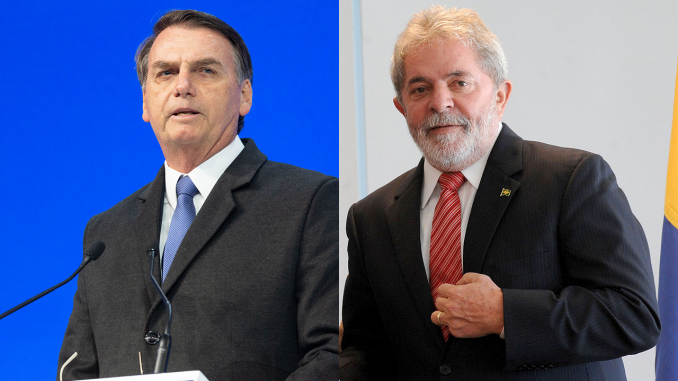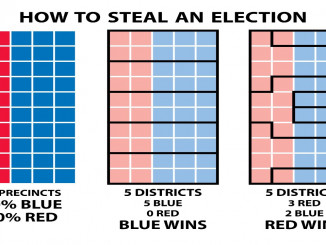
This is a translation of an article by Rafael Santos of the Partido Obrero (Workers’ Party) in Argentina, published on its website, Prensa Obrera on Aug. 18, 2022. Its analyses are those of a Trotskyist current, with information and perspective that should be interesting to our readership.
On October 2, elections will be held in Brazil for President, Governors and legislators. Polls indicate an 11% margin between former president Lula (Workers’ Party, PT) and current President Jair Bolsonaro (Liberal Party).
The former heads a broad center-left front allied to right-wing bourgeois parties. His candidate for vice-president is Geraldo Alckmin, former governor of São Paulo and leader of the right-wing Brazilian Socialist Party (PSB), one of the mainstays of the coup that toppled the PT government of Dilma Rousseff in 2016.
Bolsonaro has grouped around his candidacy numerous right-wing associations and also, particularly, leading sectors of the Armed and repressive Forces. His vice presidential candidate is General Walter Souza Braga Netto. Although an open fascist regime has not been imposed under his mandate, his reactionary, repressive and provocative policies have been highlighting that potential danger.
The distinguishing feature of the current Brazilian electoral process is that Bolsonaro has announced – just as his mentor Donald Trump did when he lost the presidency in the United States – that the current electoral system (electronic voting) may lead to fraud against him. And, provocatively, he declared that in that case he would not accept the results.
Will he, like Trump, try to stay in power through a coup?
Although the U.S. government of Joe Biden and other imperialist governments have come out to support the “normality” of the Brazilian electoral system, scorning Bolsonaro’s denunciations, this does not mean that he cannot attempt some coup adventure. Already in Bolsonaro’s current government there are about a thousand military personnel holding important ministerial and other posts.
Bolsonaro as a populist
Bolsonaro does not give up in the face of the polls that give a majority to Lula. He combines repressive measures (criminal crackdowns in the favelas, etc.) – to show his as a government of “order” and “iron fist” – with economic-social actions of a populist nature. It has decided, for example, to increase the social plans that benefit around 30 million poor people by 50% between now and the end of the year. They will increase from the current 400 reais to 600 reais (from 80 to 120 dollars). He also approved a voucher of 1,000 reais per month (200 dollars) for truck drivers who have been protesting against the increase in gasoline prices. And he increased by 53 reais (US$10) the aid to the poor to buy gas. He reinforced the program for the purchase of food, produced by “family agriculture”, by an additional 500 million reais (100 million dollars) to mitigate popular hunger, which is widespread.
There is also a subsidy to the state governments to give to the public transportation companies, freeing retirees from having to pay fares for their transportation, a bonus to cab drivers to mitigate fuel increases, and subsidies to companies producing ethanol for fuels, to lower the price of gasoline, benefiting motorists.
Simultaneously, Bolsonaro withdrew the collection of a number of state taxes on fuel sales, which led to a drop in gasoline, transportation and energy tariffs, and for the first time in decades, monthly inflation not only stopped, but there was a deflation index (-0.68% in July). The year-on-year inflation rate dropped from 11.89% to 10.09%. (These taxes were intended to cover government spending on public health and education. Their removal has not been replaced by other revenues, which will mean the defunding of these vital items. Bolsonaro disrobes one saint to clothe another).
In his three and a half years of government Bolsonaro opposed any increase in subsidies, criticizing populist policies and defending fiscal balance. Now, as a measure aimed at winning the vote of the poor sectors, he is launching this package, forcing the Lulista opposition to vote for it in parliament (there was only one vote against it).
Lula as “rescuer”
Lula and his electoral partners cry out that this is an electoral maneuver (of the type that they – on a smaller scale – did or could have proposed). With this, they show that the difference between the Bolsonarist right and Lula’s center-left opposition is one of degree in terms of “redistribution.” It accompanies the criticism by liberal sectors that Bolsonaro’s “populist”-electoralist decisions introduce the danger of the rupture of the “fiscal balance.”
Lula has no program for the social transformation of Brazil. And neither for the recovery of the workers’ social gains that have been mostly overthrown by the governments of Michel Temer and Bolsonaro. For more than five years Lula (a former factory worker and union leader) stopped any kind of mobilization of the working class and the exploited against the reactionary attacks. Those attacks imposed a clearly anti-worker and anti-union “labor reform,” and a “pension reform” that subjugates the rights of current and future pensioners, among other measures of the same tenor.
The Central Workers’ Union (CUT) and the mass movements led by Lula’s PT justified their paralysis and opposition to struggle against these capitalist attacks with the perspective that the gains would be recovered with an eventual electoral triumph that would bring Lula and his “broad front” to power.
But Lula has already come out to confront any kind of illusion in that sense: he has been clear in his electoral pre-campaign and before the business chambers that examined him, that he was not going to repeal these anti-worker reforms, and fully sanctioned the losses. Lula made it clear that he does not intend to repeal the labor reform, even if he eventually has a parliamentary majority. He said that there would not be any modification that was not agreed upon at a negotiating table with the employers’ chambers.
Lula presents himself as a “rescuer” of the workers from the right wing attacks during this five-year period of repressive governments, against an eventual rise of the mass struggles that might follow the trend of popular rebellion that is sweeping Latin America. He presents himself – also – as a man of “order”, the only one in a position to impose new austerity measures against the people, placing as a “guarantee” before the ruling classes his management of the mass organizations (workers, peasants, students, etc. – like Peronist Kirchnerism and the CGT in Argentina or the Boric government and the CUT and the Chilean PC).
Preventively, a considerable part of imperialism and big capital have are standing behind a new opportunity for Lula and against the dangerous adventurism of Bolsonaro.
The loincloth of the struggle against the coup
The struggle against Bolsonaro’s fascism and possible coup has been transformed into the “fig leaf” to justify the constitution of a “broad front” of the PT and the right-wing bourgeois parties. This has been actively supported by former President Fernando Henrique Cardoso and numerous bourgeois leaders of the center and the right. This is a classic “popular front” of class conciliation, that is, of subordination of the organizations of the working class and the exploited to the bourgeoisie and its state. A considerable part of the left has integrated itself to this popular front. Among them the PSOL, the center-left party, which was a model and emblem of the opportunist left not only in Brazil, but on a continental and international level. Praises were sung about the progressive character of the “new left” – which renounced the struggle for a workers’ government – and of its non-militant character, organized as a party of tendencies with a bourgeois-electoralist orientation. Painting Bolsonaro’s “fascism” as “the main enemy”, the PSOL even renounced its independent candidacy and went on to support Lula and his “frenteamplista” candidates (Fernando Haddad in Sao Paulo where Guilherme Boulos of the PSOL had come second in the municipal elections of a year ago, etc.).
The campaign “against the coup” has become the axis of the electoral campaign. Lula is exploiting this angle to avoid any kind of electoral mobilization where the demands of struggle of the exploited masses are raised. Democracy or fascism, Lula or Bolsonaro. It is about diluting and subordinating the aspirations of the working masses behind the defense of “democracy.” This is an operation even more profound than the one carried out in Argentina by the Alfonsín government when it emerged from the dictatorship in 1983.
The trap of the “democratic” letters
The writing of “democratic letters” has been promoted, stating the respect for the next electoral result and the defense of the current institutions of the “democratic” State (dominated at this moment by Bolsonarism). On August 11, two texts were read: one promoted by the most important business center (FIESP) and the other by the University of Sao Paulo. It is a “Letter to Brazilians in Defense of the Democratic Rule of Law.” They are politically timid documents that talk about democracy in general and respect for the upcoming election results. But they do not even mention Bolsonaro! The participants in those events made clear the prior commitment that Bolsonaro was not going to be directly attacked. The FIESP letter was read by the former Minister of Justice of the Cardoso government who, a few minutes before and by way of introduction, emphasized that it was about “the union of capital and labor” in favor of “democracy.”
The Letter was signed by all the bosses’ candidates (except Bolsonaro and Vera Lúcia of the PSTU and the Revolutionary and Socialist Front), starting with Lula, by the leaderships of the CUT and other mass organizations led by the PT.
Part of the so-called left did not sign it, but considered this day of August 11 as the beginning of a mobilization campaign “against the coup.” Although the CUT and other organizations promised to mobilize for that date, the demonstrations were small.
The struggle against the coup and the mobilization of the masses
To really confront the coup threat and the provocations and actions of the right wing it is necessary to mobilize the working class and the exploited masses of Brazil. And for this it is not a question of “unity of action” with the business chambers and the pseudo-democratic bourgeoisie. The mobilization of the masses must raise the banners of the masses: the peremptory demands for wages, against the precariousness of labor for the annulment of the labor and pension reforms, the demands of the indigenous communities and of the peasants, the rights of women (right to abortion, etc.), etc. And this is IMPOSSIBLE if one pretends to seek “milestones” of unity with the pseudo-democratic bourgeoisie and the justice of the “rule of law.” If any of these demands are raised, the pseudo-democratic bourgeoisie will quickly run into the arms of Bolsonarism.
The struggle for the independence of the working class from the bourgeois state (whether right- wing or fascist), the bourgeoisie and its parties is imperative. Stopping an eventual coup d’état will not be done by through “democratic letters” signed by chambers of commerce and parties of the bosses, but by strikes and mass political demonstrations leading to a general strike. The Revolutionary Socialist Pole must publicly adopt this strategy and place the center of its agitation – in the developing political electoral campaign – in the struggle for the flags of the working and exploited people. The preparation of a workers’ and popular congress with delegates elected from factories, unions and organizations of the exploited is the strategic objective necessary to organize a truly independent front of the struggle of the masses, and to overcome the pro-bourgeois bloc of the CUT, the PT and their bureaucratic leaderships.




